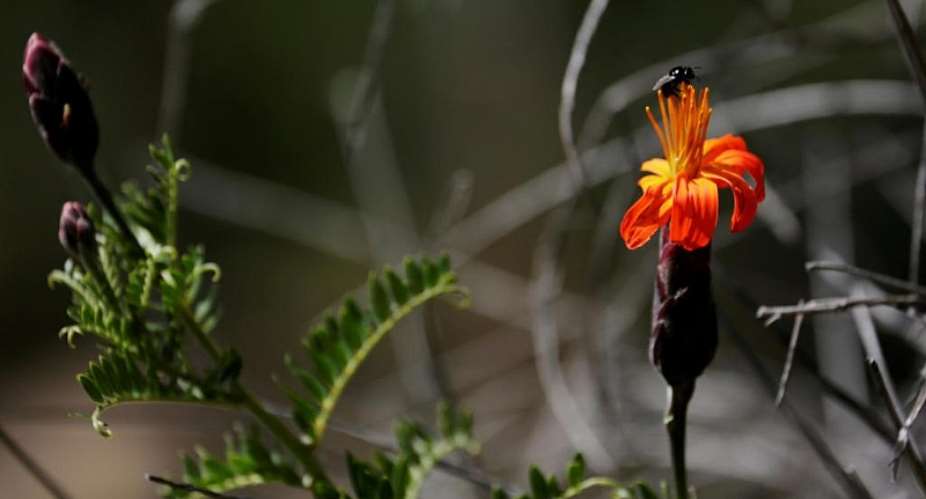As the world marks Biodiversity Day this Wednesday, scientists are keen to drive home the message that not only is protecting nature as critical a task as curbing climate change – but the two global emergencies are inextricably linked.
“Many of the drivers of climate change and biodiversity loss are the same,” Paul Leadley, a professor of ecology at the University of Paris-Sud, told RFI. “In particular these include changes in land use, such as deforestation and intensive agriculture.”
Actions that can be taken to mitigate biodiversity losses and climate change include halting deforestation – especially in tropical forests – and restoring forests in places where it's appropriate, Leadley says, adding that improving soil health can also have benefits.
Of course throughout Earth's history climate change and biodiversity have always been bedfellows, over time changing in response to one another. What's different now is that rapid global warming is affecting the ability of ecosystems to adapt – resulting in biodiversity losses.
A million species under threat
Leadley is also the lead author of a major report published this month by the UN's international panel on biodiversity, IPBES, which warns that more than a million species face extinction as global ecosystems erode faster than ever before.
It's no surprise that climate change is one of the principal causes of biodiversity losses, after changes to the way humans use the land and the sea, as well as the direct exploitation of organisms.
Strategic policies, we're told, are needed to make sure that governments take the proper and appropriate action to balance the challenges of both biodiversity and climate change.
The good news is we're beginning to see a bit more convergence on a government level between the two, says Leadley.
“The most recent G7 meeting in France on the environment brought the biodiversity and the climate communities together … with ministers talking about the synergies and trade-offs of treating both – and how to bring the two issues to the forefront of the political agenda.”
With climate change and pollution getting the most attention, Biodiversity Day, 22 May, hopes to boost the world's understanding of biodiversity issues. This year's theme "Our Biodiversity, Our Food, Our Health" raises awareness of just how much humans rely on nature for food.
Homogenisation of our global diet
The mass extinction of species isn't simply something to be curious about, the Food and Agriculture Organisation warned on Wednesday. Our global diet is becoming more homogenized – and at stake is our food security and our health.
Given that 75 percent of the world's crops depend on pollination, a decline in bee populations means some of our favourite foods risk disappearing. And of course the absence of a diverse diet is directly linked to illnesses such as diabetes, obesity and malnutrition.
“Many of our fruits and vegetables and other things we like a lot such as coffee and chocolate are pollinated by both honeybees and wild pollinators,” says Leadley.
“Some of those crops are at risk. For example, in Europe, fruit producers are having difficulty getting good pollination levels in their orchards because of pollinator populations being decimated by several factors, including the overuse of pesticides.”





 We’re disappointed over gov’t’s lacklustre attitude to negotiations of our condi...
We’re disappointed over gov’t’s lacklustre attitude to negotiations of our condi...
 No more Buffer Stock as Mahama promises to decentralise SHS food supply
No more Buffer Stock as Mahama promises to decentralise SHS food supply
 NSS urges President Akufo-Addo to sign National Service Bill into law
NSS urges President Akufo-Addo to sign National Service Bill into law
 You're lying, your 7-11pm dumsor attributed to overloaded transformers is false ...
You're lying, your 7-11pm dumsor attributed to overloaded transformers is false ...
 Consult Council of State on anti-gay bill – Mahama advises Akufo-Addo
Consult Council of State on anti-gay bill – Mahama advises Akufo-Addo
 Transport Ministry has no power to determine fares – COPEC
Transport Ministry has no power to determine fares – COPEC
 Brace yourselves for more economic hardship – Prof Adei to Ghanaians
Brace yourselves for more economic hardship – Prof Adei to Ghanaians
 Any government depending on IMF is likely to fail – Grand Coalition
Any government depending on IMF is likely to fail – Grand Coalition
 Ghana risks losing premium cocoa position due to galamsey – COCOBOD laments
Ghana risks losing premium cocoa position due to galamsey – COCOBOD laments
 Akufo-Addo launches NSS policy document to tackle under-utilisation of service p...
Akufo-Addo launches NSS policy document to tackle under-utilisation of service p...
